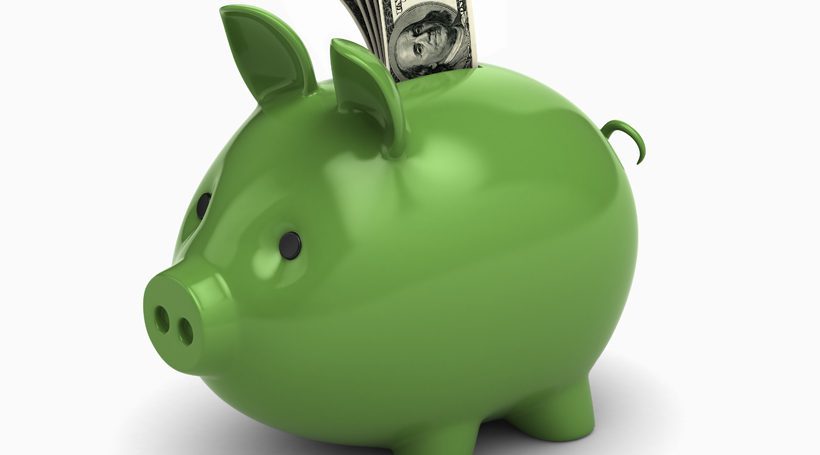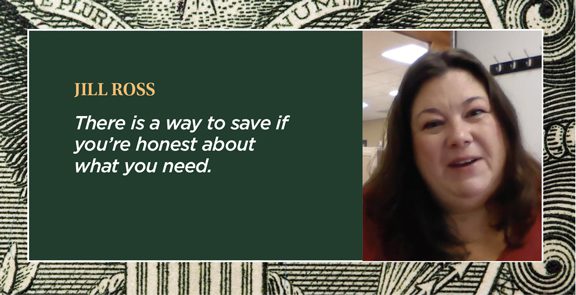
Participants:
Greg Carlisle, Commercial Market President of South and Coastal New Jersey, TD Bank
Jill Ross, SVP/Chief Experience Officer, First Commerce Bank
Gerald McKee, SVP/Director of Retail Banking, Cornerstone Bank
Antonio Ribeira, Principal, HBK CPAs & Consultants
Jason Braatz, President, Braatz Wealth Advisors
Amy Leis, Founder/Financial Advisor Juno Wealth Management
As 2023 comes to a close, we spoke with experts from the South Jersey banking and financial industries to discover what we should be looking out for in the year ahead. (Hint: you might want to pay off that debt.)
Key financial challenges for next year…
I think next year you’re going to have interest rates stay higher for longer, and I think costs will continue to go up. And while inflation is peaking, that doesn’t mean prices are going back to where they were. For clients who know they’re going to need a certain amount of funds in the next 12-18 months, I’m making those funds bulletproof right now.
Jason Braatz
There’s obviously a concern about a downturn and a recession at this point. So it’s really important to stay prepared. Think of it as your ABCs – your attorneys, bankers and CPAs. Have your conversations ahead of time. Those professionals can help you prepare for the future.
Antonio Ribeira
We’re heading into an election year. Historically, that’s always a period of volatility, regardless of who wins. The market does not like uncertainty. It’s not even necessarily about who wins so much as the market just likes to know who’s going to be in office. I’m expecting to see continued market swings until after the election.
Amy Leis
Any business owners who will be faced with a loan call next year may face a challenge. It’s possible when you received a loan 5 or 10 years ago, the interest rate was low. That isn’t the case anymore, make sure that the terms of the new loan will work for you. Start conversations now with your bank so you can plan ahead. Having conversations early will give the time needed to work through this challenge.
Greg Carlisle
It’s a tough interest rate environment right now. We have higher interest rates when you put money into the bank, but it’s also higher interest rates to borrow. If you’re looking to refinance or buy a home, it’s going to be a little bit more expensive than a few years ago.
Jill Ross
I think the high interest rate environment will continue at least another 9 months to a year. The good news is it won’t last forever. So if you get a mortgage now and in five years rates go down, you can always refinance and get out of that higher rate.
Gerald McKee
One financial move to make now…
Start now to prepare for tax season by having conversations with your accountant. It’s harder to save you money when we start the conversation in February versus starting in December. I’m as busy right now as I am in the middle of March, because I’m trying to touch base with all of my clients to talk about what we can do between now and the end of the year to save money next April.
Antonio Ribeira
Start tracking everything. Track your spending, budgeting and the performance of your portfolio. There’s no way to get to your end goal if you’re not tracking your performance along the way.
Jason Braatz
Create a budget. Look at your monthly bills and put everything into 3 buckets: spend, save, charity. If you haven’t been able to save, look for where can you cut expenses so you have money for retirement savings and an emergency fund. Then, is there a way to have something left for charity?
Jill Ross
Take a very holistic look at your overall financial picture, whether personal or for your business. Look at fixed-rate debt versus variable-rate debt. If you can, pay down that variable-rate debt.
Greg Carlisle
Prioritize putting money away for emergencies. Make sure you have 3 to 6 months of emergency savings set aside. Once you hit that emergency savings number, then start saving for retirement.
Amy Leis
If you can’t pay off your credit card debt, pay extra each month to reduce it as much as possible. You’re probably paying 18 to 25% interest – eliminating that interest expense will have a huge impact.
Gerald McKee
What to expect from your bank…
What you should be getting from your banker is trusted advice. Count on your bank to inform you about options for loans and investments, as well as updates on what’s going on in the world of fraud. If you get a letter from the IRS that doesn’t look right, for example, have someone at your bank review it to see if it looks authentic. If you’re a commercial client, you should have a commercial relationship manager – that’s who you can rely on for trusted advice.
Greg Carlisle
Banks are a good, safe place to have important conversations. I have a life-stage checklist that I go through with clients. Are you buying a house? What do the next 5, 10, 15 years look like? What will you have to budget for? Do you have kids going to college? Are you saving for retirement? Your banker’s job is to help you with those questions and offer sound advice.
Jill Ross
Your banker should be a trusted adviser. That’s how we position ourselves at our bank. Especially if you’re a small business owner, you should be thinking of your banker, the same way you think of your lawyer or accountant. They should be someone you feel comfortable with who knows the market and you can bounce ideas off of.
Gerald McKee
One financial mistake people make…
A mistake I’m seeing a lot right now is not taking advantage of good interest rates. Interest rates are high, I have clients earning 5.3-5.4%, yet I continually see people who have $50,000 sitting in their checking account earning .02%. They’re giving away free money. You should find a place where you can earn 5% or more.
Jason Braatz
In today’s world, where we have access to so much information, we think we can do it all on our own. But there’s a professional out there who has seen your situation 100 times, even though it feels like it’s unique to you. Sometimes it’s better to have someone else provide advice with clarity and no emotional bias. You might feel you’re the only one going through this, but chances are, I’ve seen it before and I can provide you advice that you might not be thinking about because you’re clouded by that emotional bias.
Antonio Ribeira
Taking money out of retirement funds for non-emergency purposes can be a mistake. You end up paying the 10% penalty and a higher tax rate. Sometimes people have to take it out because they lost their job and they have an emergency expense. But some people take it out when it isn’t necessary, and they pay the price.
Jill Ross
You really need to fight the urge to live above your means. You’ll see someone who has the big house, drives the nice car and goes on big vacations. But what you may not know is they’re deeply in debt, because they are living above their means.
Gerald McKee
It’s a mistake to not have specific goals and not check that how you spend and save are aligned with your values and those goals. Most people don’t think about it, and money flows through their fingertips. If you don’t track your money, you don’t know where it goes.
Amy Leis
One big mistake is relying too much on credit cards without paying off the balance at the end of the month if you can do so.
Greg Carlisle
Investing in the stock market…
Try not to disrupt the compounding of interest by jumping in and jumping out. Everybody wants to try and time the markets. You can time the markets on occasion, maybe get lucky and trade here and there. But broadly speaking, stay invested and continually add to it. There’s an old adage: “It’s time in the market that makes you money, not timing the market that makes you money.” That couldn’t be more true.
Jason Braatz
Work with a financial advisor, because we know through behavioral finance, which is the psychology of money, that money decisions are emotional decisions. Having someone who can help you make objective, logical, rational choices is going to help you in the long term.
Amy Leis
Make sure you understand the underlying fundamentals of any stock you’re considering. Understanding the stock market is more than just reading a quick tweet or looking at something in Robin Hood. Research through reputable resources and seek out a wealth manager if you are looking to create an investment portfolio.
Greg Carlisle
Don’t panic. A lot of people sell low because they’re panicking. This is when you need that financial professional to advise you on the right time to sell. I have a lot of clients who sold low, and then the stock came back up, and they were kicking themselves because they didn’t listen to hold. It seems fundamental, but buy low and sell high.
Jill Ross
On credit cards…
Credit cards, in and of themselves are neither good nor bad. It’s what you do with them that matters. If you are using them wisely and paying the balance every month and using your points for travel or to get money back on purchases, that’s fine. But then if you fall into credit card debt, it’s like being eaten alive by Piranhas.
Amy Leis
Credit cards are useful if you’re able to be disciplined with them. They’re great for short-term financing – you purchase something, and then a month later, you pay the balance. Where people run into trouble is when they keep using the credit card and don’t pay it down. Then the balance just grows and grows and grows.
Gerald McKee
I love credit cards. I probably have 7 or 8. But there’s a caveat to that: You have to be very disciplined. I don’t carry a credit card balance because the interest rates are insane. But if you’re tracking what you spend and you pay it off every month, they’re an amazing tool to increase your credit score and give you side benefits like cashback and travel credits.
Jason Braatz
Some folks are under the impression that all debt is bad debt. That’s not the case – there can be good and healthy debt. But debt that isn’t good and healthy is when you can’t pay your credit cards at the end of the month. If you’re spending more than you’re making and you can only make your monthly payments, and you’re racking up interest over time, that isn’t the best plan. But using a credit card is absolutely something you can do if you stick to your personal budget.
Antonio Ribeira
Teaching your kids about money…
One thing I try to do is make sure my kids understand taxes. Our kids go to school, trash gets picked up, we drive on roads that are paved – all that comes from what we pay into taxes. Our kids need to understand that although they may make $20 an hour, they’re only bringing home about $14 or $15 an hour. What you fully make is not what you fully bring home. They should be aware of that. It’s a hard lesson.
Greg Carlisle
I’m now doing Zoom calls with 8- and 10-year-olds, because I have clients who want their kids to learn about money at a really young age. Not everyone is comfortable teaching their kids about money – they think it’s almost like having a sex talk with your kids. But it’s super important, because they need to understand the value of having money and having it work for them.
Amy Leis
I like to teach kids about compounding interest. If they buy a pizza with their own credit card, that pizza could end up costing them $100 if they don’t pay off the balance at the end of the month.
Jill Ross
One of the biggest challenges I have with the education system is it doesn’t teach financial literacy. That’s critical to learn early. When I was growing up, my dad owned a small business. If he had a good year, we went on vacation. If he didn’t have a good year, we didn’t go on vacation. I learned from my father’s experiences. He taught me the lesson of: If you’re going to buy something, you have to be able to afford it.
Antonio Ribeira
Is it possible to save too much…
It’s a tough question. If you are forgoing some of the basics you need to live because of your savings, then yes. Or, if you’re letting high debt pile up and you have a big balance in a savings account, then yes, you’re saving too much.
Gerald McKee
It’s a delicate balance. How much do you want to leave to your heirs and how much do you want to enjoy your life? My mom used to say, “You can’t take it with you when you die.” So you have to find a balance that works for you.
Jill Ross
I’ve always been taught to pay yourself first. With every paycheck, put away 5-10% before you start paying your bills. It’s easier said than done, but that rainy day always comes, and if you don’t have the ability to navigate those times with money you’ve tucked away, you’re going to find yourself in a difficult situation. So, investing and saving too much? I don’t think there is such a thing.
Greg Carlisle
Ultimately it all comes down to your goals. Money is a tool for quality of life. I think the opposite is the bigger problem: spending too much. So I don’t think you can save too much, as long as it doesn’t come at the expense of doing what matters for you and your family.
Jason Braatz
Saving or investing too much is a relative concept that depends on what your goals are, what you want to achieve and how you want your money to work for you. If you are on track for your goals, then you’re doing just fine. But if you’re not meeting your numbers and you’re not where you want to be, then change your plan.
Amy Leis
There’s a balance between saving and also enjoying yourself. Not to say that you spend every dollar and you don’t plan for tomorrow, but you do want to make sure you enjoy life a little bit.
Antonio Ribeira
Creating a budget…
Where people fail in budget planning is not counting the little things. They don’t account for the small costs throughout the course of a month or a year. If you are a person who gets that $5 Starbucks every day, that $5 adds up to $25 a week. That adds up to $100 a month, and $1200 a year. And that’s net. When you take taxes into account, you need to make about $1700 to pay for that coffee.
Greg Carlisle
Always pay yourself first, which means put money aside for savings first. Have it come right out of your paycheck if you can.
Jill Ross
“Budget” has almost become like a dirty word. Like “diet,” right? Nobody wants to be told they have to diet. So instead, we need to move towards finding a balance between what we are spending versus what we want our future to look like, and are we taking steps to get there. Covid taught us that life is short, and as much as we budget and plan, stuff happens. It’s really important to work harder to live in that balance of enjoying the now while also still looking to the future.
Amy Leis
There’s a lot of software out there that can help you budget. And this is also where I find credit cards to be very valuable as well. I put everything on a credit card, pay it off at the end of the month, and then at the end of the year, I can see how much we spent. Your credit card statement breaks it all down in a pie chart, so you know exactly where your spending went.
Jason Braatz
You need a personal budget, because that’s going to drive your ability to save and ultimately your ability to retire. Look at your fixed monthly expenses – rent, mortgage, daycare, car payments, car insurance. Then look at how much money you’re bringing in. Prudent financial advice is spend less than you make, and you’ll be better off in the long run.
Antonio Ribeira
Having a budget is an important first step in knowing where you were, where you’re currently at, and where you can get to in the future. Think of it as a roadmap. And creating a budget isn’t as complicated as it sounds. Take a look at your fixed expenses and what you have coming in. From there, how much do you have leftover? That’s discretionary income. How much of that discretionary money can you save? And then how much do you have leftover for living life – going to a movie or on a vacation. If you don’t have the discipline to follow a budget, you might run into trouble by living above your means.
Gerald McKee


















